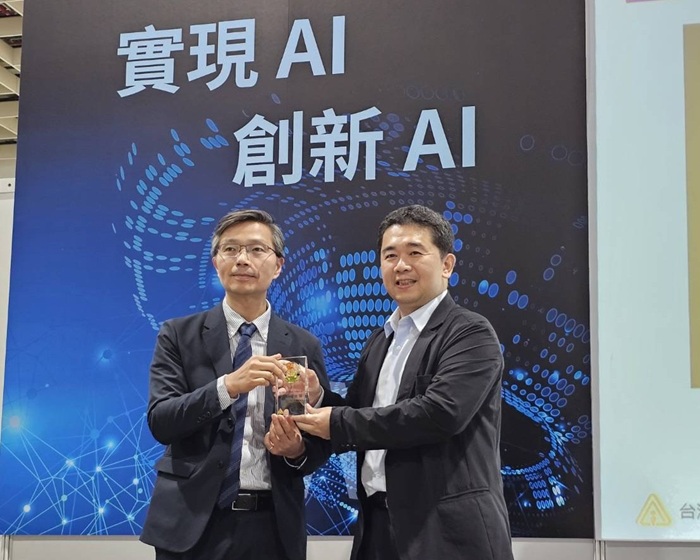The Taiwan Artificial Intelligence Association recently announced the recipients of the 2025 AI Award. Professor Tun-Yu Chen, Dean of the College of Electrical and Communication Engineering at Yuan Ze University (YZU), was honored with the "Academic-Industrial Innovation Award" for his project titled "Edge Computing Systems with Deep Model Distillation and Lightweight Design."
Since 2022, Professor Chen has led a research team in developing key AI technologies for defense and medical applications. Their work focused on deploying high-performance, low-power AI models on mobile devices, demonstrating significant achievements in translating academic research into practical industrial applications. This has provided strong momentum for smart defense, sports technology, and telemedicine.
The team has actively engaged in deep learning model distillation and pruning, successfully developing AI technologies such as image generation, lightweight object detection, and retinal segmentation. These were deployed on low-power systems. In a breakthrough defense technology project by the Ministry of National Defense, the team utilized a single System-on-Chip (SoC) for real-time inference, supporting intelligence, surveillance, and reconnaissance missions. In the field of sports technology, they collaborated with industry partners to develop a smart table tennis system, achieving real-time single-camera ball landing detection at 60–80 FPS on the NVIDIA Jetson Nano platform. For medical applications, they developed an ultra-lightweight retinal segmentation model under 3MB, effectively overcoming computational limitations of handheld fundus cameras and significantly enhancing clinical diagnostic efficiency.
Professor Chen stated that their goal was to implement cutting-edge AI algorithms in real-world scenarios with minimal power consumption. Looking ahead, they plan to continue collaborating with partners in defense, healthcare, and sports technology to expand AI's positive impact on society.
In addition to Professor Chen's award, the College of Electrical and Communication Engineering at YZU has demonstrated strong R&D capabilities in AI, semiconductors, communications, optoelectronics, and green energy. Between 2024 and 2025, eight major industry-academic collaboration teams achieved results in areas such as wafer inspection, voice recognition, millimeter-wave communications, transparent solar cells, medical optoelectronics, OLED materials, LiDAR modules, and flexible solar technology, driving the practical application of AI technologies.
For instance, Assistant Professor Yu-Hui Huang collaborated with leading IC testing company King Yuan Electronics to develop an AI-based rapid wafer image classification system. By combining foundational models with traditional image processing, they reduced visual inspection time in the back-end wafer-level packaging production line by over 90%, enabling real-time feedback on abnormal coordinates and improving production yield. Professor Hsu-Hsiang Wang partnered with Merry Electronics and the Ministry of Justice Investigation Bureau to promote an edge source separation and audio tampering detection platform, enhancing speech recognition accuracy in noisy environments and providing a real-time visual interface to improve speech investigation efficiency.
In next-generation communications, Professor Chien-Yu Lee focused on 5G/6G and low-earth orbit satellite applications, developing Ka-band active phased array antennas and GaN/SiC millimeter-wave power amplifiers. These technologies have been successfully transferred to local manufacturers, cultivating numerous professionals. In green energy research, Professor Wei-Sheng Liu developed transparent solar cells with over 70% light transmittance, offering new options for smart windows and automotive glass that combine power generation and lighting. Professor Fang-Yi Lai advanced flexible CZTS(Se) thin-film solar technology, achieving dual-sided light input devices with an efficiency of 4.13%, moving towards mass production with environmentally friendly processes.
In medical applications, Professor Chih-Hao Chang integrated deep red OLED light sources into wearable light bands for wound healing and neonatal jaundice treatment, currently in clinical trial stages. Professor Tian-Lung Chiu developed blue TTF-OLED materials, earning the Ministry of Science and Technology's "Future Technology Award" and completing technology transfer to materials and PMOLED companies. His outstanding academic research in electrical engineering also earned him the "Outstanding Electrical Engineering Professor" award.
Dean Tun-Yu Chen emphasized that the college continues to promote a three-stage innovation model of "academic deepening, technology verification, and industrial implementation," establishing a comprehensive industry-academia linkage mechanism and interdisciplinary collaboration platform. This approach injects continuous innovation momentum into Taiwan's high-tech industry. Through cross-disciplinary collaboration and innovative R&D, the college rapidly introduces advanced technologies into key areas such as national defense security, medical care, advanced communications, and green energy generation, demonstrating that solid academic research can serve as a core engine for industrial upgrading.
Established in 1994, YZU's College of Electrical and Communication Engineering is dedicated to teaching and research in four major areas: artificial intelligence, information and communication, power energy, and semiconductor materials. It integrates three professional platforms: the Communication Center, AI Center, and Semiconductor Center, fully strengthening the goals of "academic industrialization" and "talent internationalization." In the future, the college will continue to leverage its academic and research advantages, leading AI technological innovation and social sustainability in tandem.


 繁
繁